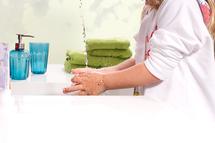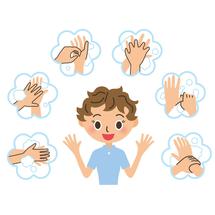Body care
Author: Maria Yiallouros, Gesche Tallen, MD, PhD, English Translation: Hannah McRae, Last modification: 2020/05/14 https://kinderkrebsinfo.de/doi/e73988
Very important:
- Tend to regular and thorough body washing, especially in the genital area.
- Be sure to wash hands often, especially before each meal, after every restroom visit, and after contact with animals.
- Avoid trimming finger- and toenails in times of neutropenia.
Recommended:
- Be sure that the child uses fresh hand and bath towels each day. To conserve laundry, other family members may continue to use the towels after the patient.
- Change the child’s clothing often and his or her underwear every day. The patient should wear mostly cotton if possible.
- Wash each undergarment and towel at a minimum temperature of 60°C (140°F) and iron all towels and articles of clothing afterwards to kill bacteria.
- Use mild body washes and lotions; no perfumed soaps or creams (pathogens can enter a child’s body through dry and chapped areas on the skin).
- Wash pacifiers, bottle nipples, and milk bottles daily and boil them in water for 5 to 10 minutes; Tip: repeat this twice for dirty bottles and pacifiers, and obtain fresh ones.
- After radiation therapy it is recommended to treat the affected areas on the skin with a powder prescribed by the child’s doctor in order to prevent or soothe skin irritation. Because the skin is very sensitive to sunlight during cancer treatment, be sure to avoid sunbathing or excessive sun exposure. If the child spends time outside, be sure that he or she wears sunscreen with a high sun protection factor (better known as SPF), and a hat to pro-tect the head.
- Pathogens and the products of cytostatic drugs can be excreted by the child, so avoid all possible contact with your child’s stool, urine, and vomit (wear rubber gloves).


